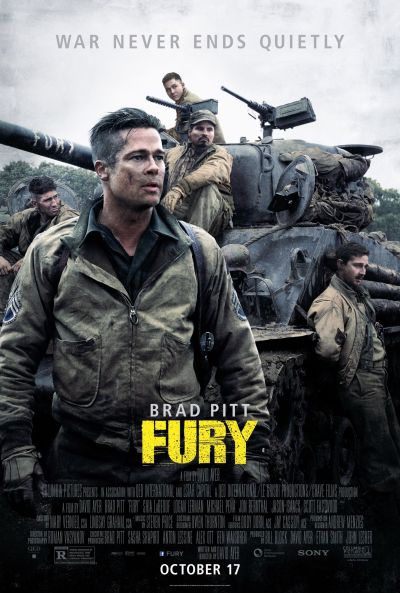| Title: | Fury |
| Director: | David Ayer |
| Cast: | With Brad Pitt, Shia LaBeouf, Logan Lerman, Michael Peña |
| Released: | 2014 |
| Playtime: | 135 minutes |
| Description: | Fury (2014): A grim reminder on the violence of war and the kind of individual needed to wage it. Fury, David Ayer’s 2014 war film, was faced with the usual hurdles that any film faces when trying to recapture the horrific scope of World War II. In spite of these challenges, and charged with a talented ensemble cast and a sharp eye for detail, the good far outweighs the bad in this drama-packed epic that analyses the camaraderie and moral sacrifice needed to survive war’s horrors. Initial impressions of Fury were nothing special. The expected themes of blood, gore and depravity fill every frame. Ayers’s keen eye for anguish gives a terrifying look at the carnage war leaves in its wake. No more is this evident than in the allied forces army barracks, introduced by way of leading man Brad Pitts as "Wardaddy", the ranking Sergeant at the helm of the Sherman tank, christened as the "Fury". On full display are heaps of corpses being hurled into deep mass graves, expressionless soldiers testing their firearms and treating their injured, and more. All are standard, near ritualistic, directorial beats of arguably the most investigated trial of human cruelty in modern history. Ayer’s largest successes in the film rely on the chemistry of its protagonists. The core ensemble cast of Jon Bernthal, Shia Lebouf and Michael Peña were all much needed ingredients to the balance of foul-mouthed, nihilistic brotherhood expected of those who can die at any minute. The only peace of mind they have is in one another, and that is shown every time they share the screen. However, the true distinction Fury creates is that of the newest edition to the ensemble, played splendidly by the ever-impressive Logan Lerman. The proxy for the audience, Lerman’s character of Norman demonstrates the moral decline expected of soldiers at war. Being a soldier is not a noble pursuit, fit for ideals or discussion, as Norman discovers upon joining the war effort. It is this chord that Ayer strikes throughout his entire narrative. As the film progresses, we are exposed to every emotion that Norman goes through and the toll it takes on him. It makes no difference that the war effort is going to benefit the allied forces. Every explosion and bullet shot through the air emphasize a simple message: war is hell. While other World War II epics tend to swerve in the direction of hope, to climb and overcome the horror of combat in the name of human decency, this picture takes another route. It examines both human savagery and the relative ease that humans adapt to it. Every fight, every confrontation (including a particularly haunting moment where Norman must take his first life) dims the light behind Norman’s eyes as he is weighed down by what is asked of him in the name of loyalty to the cause. It is here that Fury gains its depth, taking its audience on a journey on how frighteningly easy it is to go down that tragic path when the ends sadly justify the means. From time to time, the film’s seams do show. A rushed love subplot to reveal more about the cast did little for character development. Hints of memories of battles fought earlier in the war, which could have benefited from flashbacks, did not provide any real clarity of our protagonists’ journey. Ultimately, the film’s largest drawback would be the unfortunate lack of screen time for our cast members to really stretch their legs as individuals, which would have helped viewers digest a two-and-a-half-hour runtime. In the end, Ayer’s efforts in creating Fury resulted in a powerful tale of camaraderie and sacrifice. The only true comfort to be found in hard times is in the knowledge that you are not going through them alone. It is here where the film’s thoughtful execution really shines, because the ability to bond and to find purpose as a group can help people come together even in the darkest of times. |
| Rating: |     (Very good) (Very good) |
Information
- Article by:
- Allan Ntwali Byabagamba
- Published on:
- 19-06-2022



